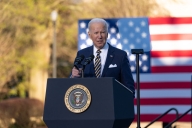You have /5 articles left.
Sign up for a free account or log in.
In several years as a search consultant, I have been struck by how quickly and easily presidential search committees agree on which semi-finalists they can envision as their next president. In the debriefing sessions after these interviews, I consistently hear committee members say that they "knew" almost immediately that a candidate was presidential material. (It is important to note that these committees had already made a judgment -- based on letters of interest, the candidate's C.V. and conversations with references -- that all the semi-finalists possessed the appropriate experience and credentials that the position required.)
When committee members begin to think favorably about a candidate, there is a palpable shift in both the tone and the texture of the interview. Specifically, even as the committee continues to ask questions, at least some members begin to court the candidate. There is an equally discernible shift when a candidate who was extremely promising on paper and whose references were glowing is disappointing in person. In such instances, the committee generally becomes less animated. Some people begin to doodle. Others glance at their watches. Occasionally, someone sneaks a look at his or her Blackberry.
Candidates should be reassured that committee members do want to be fair and so spend the remainder of the interview and the group's ensuing deliberations seeking to affirm or deny their initial impression. They listen hard to their committee colleagues but if their initial judgment, whether positive or negative, is a shared one, it will prevail.
So what is it about candidates that create the impression that they either are or are not presidential? And does appearing presidential at an interview actually have anything to do with being a successful president?
Tolstoy began Anna Karenina by observing, "Happy families are all alike; every unhappy family is unhappy in its own way." And so it is with interviews: despite their diversity in terms of background, experience, gender, ethnicity and age, successful candidates exhibit common behaviors whereas unsuccessful ones are unsuccessful in a variety of different ways.
Specifically, the most compelling candidates all do the following:
- They immediately and in an understated way transform the interview from a question and answer session to a genuine and often lively conversation. They do so because in addition to listening carefully to and answering questions, they also ask insightful questions of their own. For example, one successful candidate asked committee members to envision that over the coming 10 years, the college had met its most important goals. How, she then asked, would the institution look and what would the differences be from its current profile? Committee members found the question so interesting that had the chair allowed it, they would have taken up the entire interview time sharing their views. By asking the question, the candidate engaged the committee. She also learned through their answers a good deal that helped her shape her response to later questions.
- They readily admit when they don't know the answer to a question (although such a response should be the exception rather than the rule).
- When asked open-ended and often loaded questions such as "what is your position on fraternities and sororities?" and "what do you think about athletics?" they ask for context. Then, after understanding a bit more about what was behind the question, they articulate a set of values that would govern their actions as president rather than presuming -- without knowing the institution better -- to outline a specific course of action.
- They have done their homework and do not ask factual questions but rather ask committee members to interpret what they have learned about the institution. For instance, interviewing for a presidency on a campus where retention had been identified as a major problem, the strongest candidate did not ask "what are your retention numbers?" but rather asked, "Do you have reliable data on why 25 percent of your first semester freshmen leave, what actions have you taken to improve retention and what have you learned along the way?" Candidates who can't find answers to factual questions in the profile or on the institution's Web site should however feel free, prior to their interview, to seek answers from the search consultant or, if the institution is doing the search on its own, the executive secretary to the search committee.
- They have taken the time to learn something about the members of the search committee. Although many colleges post short bios of search committee members on their search Web page, committees are impressed by candidates who have "Googled" them. The candidate who asked the student representative how the volleyball team was doing won lots of points for knowing that the student played volleyball. The faculty members and trustees on the committee were even more pleased that the candidate was paying attention to the student. Another candidate, when introduced to a committee member who was both a trustee and the parent of a recent graduate, asked why the trustee's daughter had chosen the college, what the quality of her experience had been and what she was doing now. He too made allies even before the questioning had begun.
- They exhibit a sense humor. This is not to suggest that candidates tell jokes. Quite the contrary. But candidates do need to smile and to make others in the room smile. When committees and the candidate share some laughter, that is usually a sign of the chemistry being right.
- College presidents need to play handball, and so do candidates. Or to put it another way, candidates need to be at ease responding to questions that come out of nowhere. One candidate graciously fielded an inappropriate question about his religious background. Other committee members were upset by the question and grateful to the candidate for being gracious. He was invited for a campus interview. Another candidate at an open forum during his campus visit was asked a question about his wife, who was in the audience. He gently suggested that the answer would better come from her than from him. She seemed pleased to respond. Both the women and men in the audience were impressed that he deferred to his wife rather than speaking for her. He was offered and accepted the job.
But what are the pitfalls present in the semifinalist's interview? Based on my experience as both a search consultant and a college president and on that of my friends and colleagues who have served on search committees, the candidates who do one or more of the following lead committees to look in another direction.
- They answer the question they wished that had been asked rather than the question they were asked. That may work for media sound bites but committee members -- who have thought long and hard about their questions -- are not happy with what one called "a diversionary tactic."
- They fail to acknowledge the executive secretary to the search committee. In one instance, a semifinalist walked around the room to introduce himself to committee members but ignored the executive secretary with whom he'd had frequent contact. The next 90 minutes were pro forma. The committee had already concluded that this was a person who would not respect the staff.
- They rely on rhetorical fillers like "um" and "you know." One search committee member saw it as his role to keep track of such infelicities and kept a running tally of how often each candidate uttered such phrases.
- They exhibit ambivalence about either the position or the institution. One committee rejected a candidate who seemed to want career counseling. Committees instead want candidates who are unhesitating in their wish to be the president of the institution.
- During campus visits, they reveal a different persona in private from the one they display in public. One finalist lost credibility with the committee when he sat silently in the backseat when being driven by a student the two hours to and from the airport. The committee later enthusiastically embraced the candidate who sat in the front seat with the same student driver and took the occasion to ask him lots of questions about the college and, as importantly, listen to the answers.
- During campus visits, they complain to those meeting them how tired they are, thereby worrying the committee about whether they have the stamina, the energy and the resiliency for the 24/7 demands of a presidency.
Finally, appearance matters, and unfortunately it seems to matter more when the candidate is a woman. Simply stated, at first (and even second and third) glance, men have fewer problems than women do in looking presidential. Men can wear a dark suit, an ironed shirt and a presentable tie. Women have many more decisions to make. Should they wear a suit, a dress or -- now that Secretary of State Clinton has changed expectations in this regard -- a pant suit? If a skirt or a dress, how long? Neutral hose or tights? How high a heel? What about hair style, hair color and make-up? How much jewelry and of what sort?
The following stories about candidates whose appearance was a negative are drawn not merely from my experience but from that of friends and colleagues.
A very capable candidate alienated the search committee because of her abundant make-up. An otherwise stylish candidate who had hair-sprayed "big hair" that didn't move as she nodded her head distracted committee members from her answers because of their fascination with this hair that seemed to have its own separate life. At the other end of the spectrum: a candidate who wore no make-up at all was rejected because she appeared "unfinished" and "washed out." Another lost votes because she appeared "frumpish" and "too matronly." Then there was the very attractive candidate who showed up for her interview in a jogging suit.
Once they become presidents, women continue to have a special burden in terms of attention to their appearance. For example, throughout her very successful presidency at the University of Pennsylvania, Judith Rodin's dress and hairstyle were the subject of public
commentary in ways not true for men. In October 1994 a New York Times reporter described President Rodin this way: "In the
gray-tweed and furrowed-brow world of academia, Dr. Rodin turns heads with her cover-girl smile and designer clothes." Almost nine years later, in May 2003, another Times reporter in a news article about Rodin's stance toward unions described her as having "her hair
expertly frosted."
There are to be sure men whose appearance serves to distance committees: a bold tie that by the committee's standards is ugly, clothes that don't fit and colors that clash but even these fashion problems are more apt to be ignored or even praised in men. For
example, USA Today in July 2007 described Ohio State President Gordon Gee this way: "With his horn-rimmed glasses and bow ties, Gordon Gee embodies the geeky college president. And right now geeky is in -- along with a stellar fundraising portfolio and an affable manner." And the fact that Larry Summers is often described as being rumpled and overweight, with ill-fitting clothes, obviously didn't dissuade Harvard from making him president.
Of course, a candidate's appearance goes beyond any simple notions of "dressing for success" and extends to bearing. The candidate in the jogging suit might have pulled it off had she not slouched, whereas I know of several very well-dressed candidates who have lost the good will of the committee because they had no eye contact with committee members. One such candidate took notes throughout the interview. Another exceedingly formal candidate began every answer with a somber, "That's a good question" and ended his answer with an even more somber "Thank you." A good member later likened him to the character in Li'l Abner who always had a cloud over his head.
In the end, the most pertinent question is this: Does seeming presidential at an interview have anything to do with whether a person is successful as a college president? I have concluded that it does because of the nature of the job itself. College presidents need to be able at all times of day or night to walk into a room and engage those who are there. They need to defuse difficult, even angry situations by being gracious. They need to be effective in public and private gatherings and meetings, whether they are tired or rested, whether they know the people they are meeting or know none of them, whether the questions are likely to be softballs or sharp arrows, and whether the questions are fair or unfair. They need to be able to turn meetings into conversations, to use humor when appropriate and always to represent their institution well. They need to be well-informed before making judgments. They need to be articulate. They need to ask the right questions, lots of them. They need to inspire confidence. They do need to be able to play handball. In short, even as a president, they need to appear presidential.








